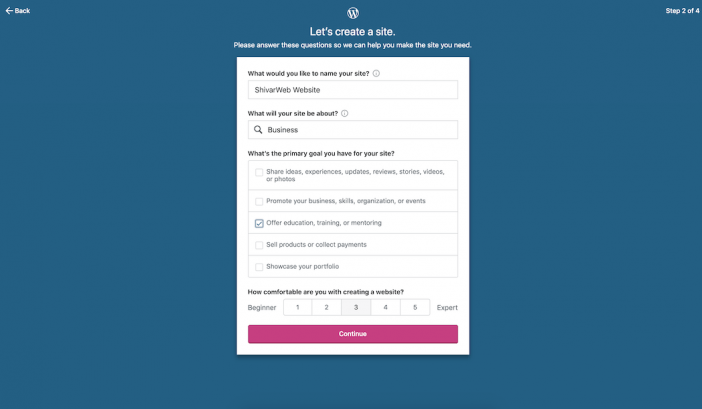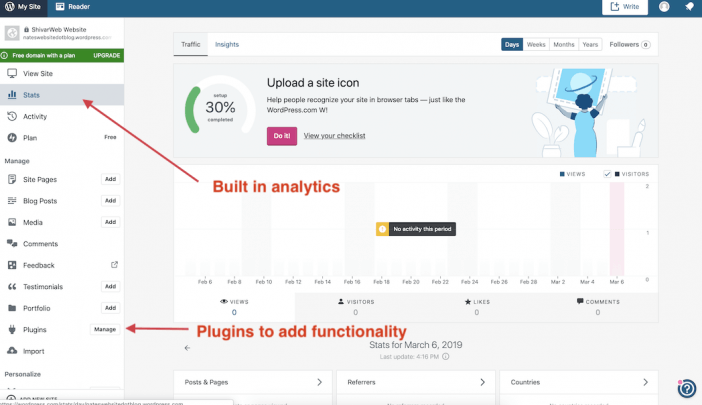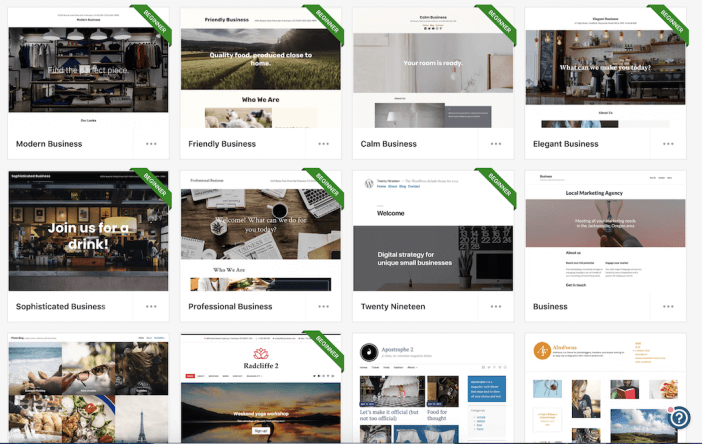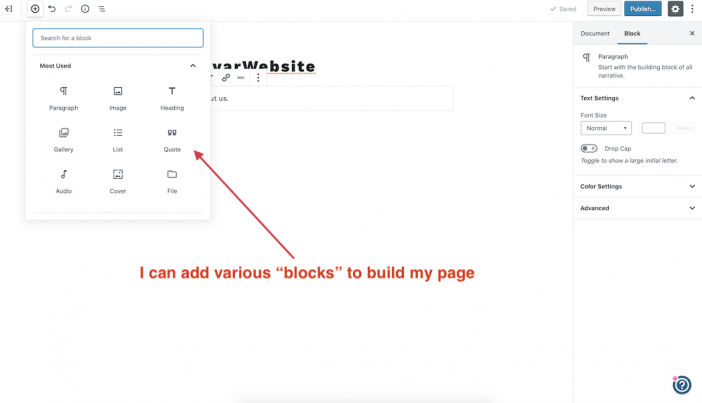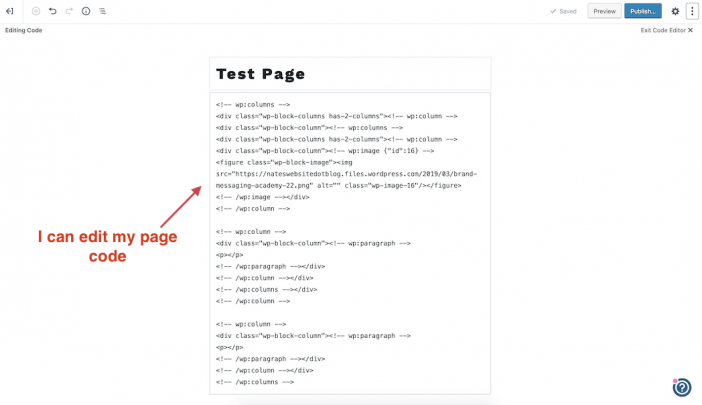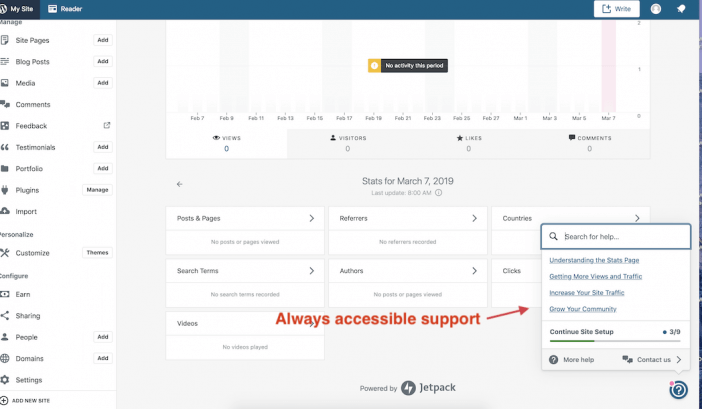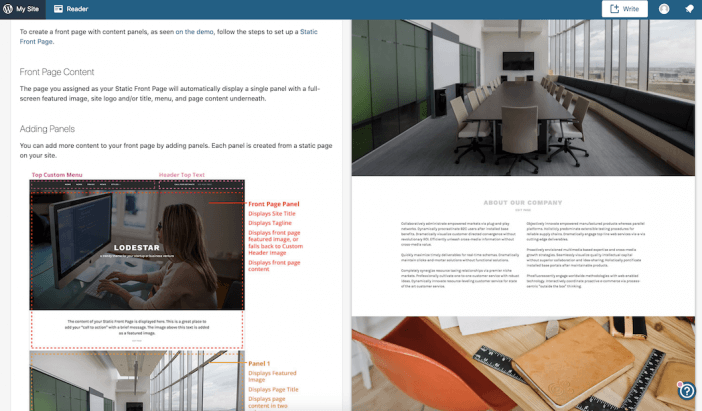WordPress.com Review
| Support | Help Desk, Forum & Knowledge Base |
|---|---|
| Uptime | Excellent (99.99% past 6 months) |
| Best For | WordPress.org Without The Hassle |
| Strengths | WordPress Versatility and Features |
| Weaknesses | Not As Flexible As WordPress.Org |
| Promotion | Get Started For Free |
What Is WordPress.com?
WordPress is one of the most popular pieces of software in the website space. WordPress powers over 43.1% of the Internet and is famous for its versatility and ease of use.
It is so well-known, that it’s common for people with some web design experience to generally say “just use WordPress” when referring DIYers and freelancers to a website solution.
In this article, I’ll be reviewing WordPress.com as a website builder and general website solution for DIYers. If you are wondering what’s different between WordPress.com and WordPress.org keep reading below.
WordPress.com Pricing
| Plan | Free | Starter | Explorer | Creator | Entrepreneur |
|---|---|---|---|---|---|
| Price* | $0.00/mo. | $4.00/mo. | $8.00/mo. | $25.00/mo. | $45.00/mo. |
| Websites | 1 | 1 | 1 | 1 | 1 |
| Storage | 1 GB | 6 GB | 13 GB | 50 GB | 50 GB |
| Visitors/month | unmetered | unmetered | unmetered | unmetered | unmetered |
| Free Domain Name | 1 year | 1 year | 1 year | 1 year | |
| Free SSL | |||||
| CDN | |||||
| Dedicated IP | |||||
| Daily Backups |
WordPress.com vs. WordPress.org
Before we delve into the nuances, it’s vital to distinguish between WordPress.com and WordPress.org. At its core, WordPress is a robust piece of software designed to streamline your website’s backend operations. This means that rather than manually uploading files to a server, WordPress offers a comprehensive “backend” environment. Here, you can effortlessly create, modify, and manage various content types—from web pages and blog posts to images and beyond.
Dubbed a “content management system” (CMS) in the tech realm, WordPress stands out for being “open-source.” This signifies that instead of being owned by a single for-profit entity, it thrives on community collaboration. A non-profit foundation oversees the trademark, ensuring the software remains freely available under a General Public License.
The heart of this open-source community beats at WordPress.org. Here, anyone can download the software, embodying the true spirit of sharing and innovation. Yet, it’s crucial to note that simply obtaining the software doesn’t equate to running a website. Two additional components—web hosting (a server where WordPress operates and your website becomes accessible) and a domain name (the address through which people find your site)—are essential.
This leads us to the concept of “self-hosted WordPress” at WordPress.org, where the onus is on you to secure hosting and domain registration. This platform is ideal for those eager to dive into setting up and customizing their WordPress website.
On the flip side, we have WordPress.com, a commercial venture spearheaded by Automattic and founded by Matt Mullenweg, a key figure behind WordPress. Unlike its .org counterpart, WordPress.com offers a packaged service. This encompasses not just the WordPress software but also hosting, support, and additional services under a unified subscription model—aptly described as “hosted WordPress.”
The distinction can be likened to the real estate analogy of renting versus buying:
- WordPress.com: Imagine renting a property for your living space—or in this case, your website. While you can opt for upgrades, the final say lies with the landlord (WordPress.com). However, the landlord also bears the responsibility of maintenance.
- WordPress.org: Contrastingly, owning a property equates to complete autonomy over your space. You’re at liberty to make any changes in your hosting environment, bearing all responsibilities that come with ownership.
The essence of this comparison boils down to a tradeoff between convenience and control. WordPress.com positions itself as an all-encompassing website builder, contending with platforms like Squarespace and Wix. Here, you trade a degree of control (e.g., no FTP access) for significant convenience (e.g., automatic security updates, no risk of crashing your site).
Among its competitors, WordPress.com is particularly lauded for its scalability, superior support, and flexibility.
If you want to get more into the weeds, I wrote a whole post aboutWordPress.com vs. WordPress.org, offering insights into choosing the platform that best aligns with your web development needs.
WordPress.com Alternatives
There are many options available if WordPress.com isn’t the right fit for you. If you are looking for alternatives to WordPress you may want to check out my best website builders.
Though in my opinion, you are best to stay with WordPress hosting and find the best option.
Pros Of WordPress.com
Here’s what I found to be the pros of using WordPress.com website builder — not just in comparison to direct competitors, but as an overall website solution.
Easy Sign Up Process
One of WordPress.com’s biggest advantages is how easy it is to get started. To get your website up and running, you just follow a simple, 6-step process that includes creating an account, filling in your website information, and confirming your email address.
They also provide a ton of “onboarding” support (AKA the process of getting up and running with a website). I immediately received an email detailing the next steps and was even prodded later in the day when I hadn’t finished a step in the setup.
There was really no part in the signup process where I wondered, “What’s next?”. The steps were easy to follow, detailed, and included support once I got inside the dashboard.
If you’re looking for a simple, straightforward, and speedy way to go from having no website to having a site ready to build, then WordPress.com is a great choice.
All-in-One Solution
Again, WordPress.com is an all-in-one solution, which means everything you need — from hosting to domain name registration to integrations (more on that shortly) to design options are all included in the platform.
That means everything just works — there’s no figuring out if this app or extension is compatible or is going to break your site. There are no troubleshooting or support needs outside of what they already offer. Even things like analytics are built into the platform.
Spending less time on research and troubleshooting means you can spend more time on stuff that matters – like content, design, and marketing your site.
Plus, since WordPress.com uses WordPress as its CMS (and WordPress is the most popular CMS platform out there), the integrations are practically limitless.
Chances are, there’s been a plugin created to do whatever you need your site to do. And if it hasn’t been created yet, there’s a developer out there who could probably get it done. Just know that on WordPress.com, your advanced customization capabilities, like installing your own plugins and themes, are limited to their highest-priced plan (more on that in a bit).
You also don’t have full control over the website functionality, because you don’t have access to your hosting. You still don’t have direct access to your files or your database. So if you want to do something in bulk or something super-technical, then you are out of luck.
That said, compared to other website builders (like Wix or SITE123), WordPress.com is inherently more open and accessible because it runs WordPress software.
All of your content is in RSS and XML format, so it’s very easy to leave WordPress.com for another service or bulk export your content.
WordPress Template Designs
When you set up your website with WordPress.com, you have a ton of pre-made templates (“themes” in the WordPress jargon) to choose from, including premium themes that come with higher-priced plans.
WordPress.com also indicates which themes are best for beginners, which is helpful for those who don’t have extensive website experience and are looking for the easiest way to get their website designed and ready to market.
Inside these themes, you have a range of customization capabilities based on the plan you have. You also have significant customization abilities on the individual pages themselves— even with the free plan. Inside the page builder, you can change the format by adding columns, embedding elements, and even editing the page code if you know HTML / CSS.
One thing to note here — you cannot edit/customize the pages on the same screen that you edit the theme. This means that you’re basically designing the pages in a bubble. You can’t see how they play out in the context of the design until you actually go in and edit the theme. If you’re not looking to do any advanced designing, this may not matter to you, but it’s something to keep in mind if you are looking to build lots of websites for clients.
Customer Service
WordPress.com has a robust knowledge base and easily accessible support.
In fact, their help button floats in the bottom corner of the Dashboard (and when you’re editing pages), so you can see relevant guides and articles to help you no matter where you are in your website.
You can also chat with another WordPress.com using their “Contact us” button on the floating help section, giving you an additional option if you can’t find the answers you’re looking for.
Cons Of WordPress.com
But of course, no website builder would be complete without looking at the downsides.
Every piece of software will have complaints because there is no website solution that is right for everyone. Let’s look at a few specific cons I found.
Higher Pricing
WordPress.com is a bit pricier than its competitors when you take into account what features are available to you. WordPress.com limits the amount of storage space you get on your website (AKA the number of images, video, audio files, documents, etc. you can upload to your site).
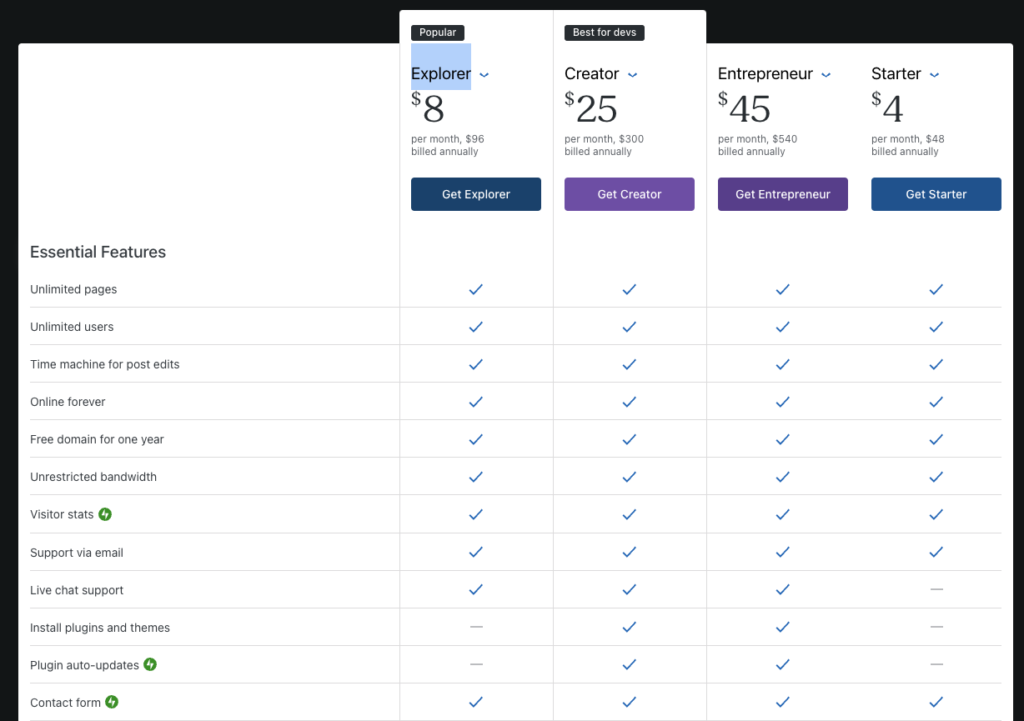
Now, there is one caveat. WordPress.com does have a free plan.
You can’t use your own domain name. You have to use yourname.wordpress.com – and serve WordPress.com ads on your site. But – it’s free. This plan is certainly my favorite way to get a free, well-built website online.
However, it’s not clear that there’s a free plan available unless you go through the pricing tab. For example, if you were to click “Get Started” and just start filling in your information, you’re kind of cornered into buying a plan. There’s no option there to select a free plan. It’s confusing, especially if you don’t know that there’s a free plan available (which technically, you’re automatically signing up for when you create your account).
It’s available on the Plans & Pricing web page.
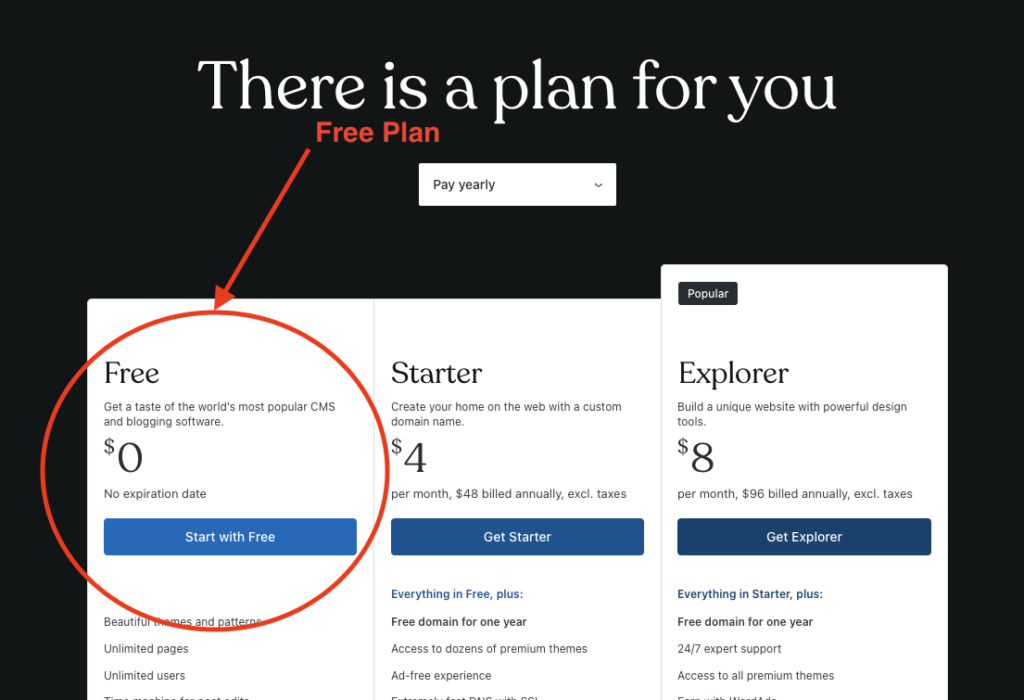
If you are trying to start just a basic informational website or blog and don’t want to deal with hosting, then WordPress.com’s Blogger and Personal plans are well-priced.
For a business or really any size (or website that is going to strive to make money), then it’s a bit hard to compete with building your own WordPress website or another drag & drop website builder.
Learning Curve With WordPress
Based on your website experience, using WordPress as a CMS does come with a learning curve — and it’s no different when it’s bundled with hosting and DNS services through WordPress.com.
Yes, you have various themes to choose from that guide your site customization experience, but even those can be more complicated to tweak than WordPress.com wants to let on. Check out the instructions on customizing this theme I selected.
If you’re looking for the ease of a simple drag + drop website builder where you can literally drag elements onto the page, drop them in place, and customize your template that way, WordPress.com might not be the best choice for you.
This is because WordPress uses a visual website builder called Gutenberg. While Gutenberg is a visual editor, it isn’t exactly the same as what appears on your website. This can be confusing and difficult when first using WordPress compared to other website builders.
There are some website builders where what you build within their editor is exactly how it appears on the published version of your website.
Limited Functionality
WordPress is known for how flexible and adaptable it is as a CMS.
It’s a great way to build a website that you plan on keeping for the long haul because it’s so customizable and scalable. But here’s the thing — those benefits don’t really kick in until you have a self-hosted WordPress (AKA WordPress.org), or until you pay for the Creator plan on WordPress.com, and even then you don’t have full accessibility with your website.
If you’re not looking for a website that you can customize and scale extensively, then this probably doesn’t matter to you.
But if you are looking to create a website that you can scale, and you were drawn to WordPress as a CMS because of that, then going with “hosted WordPress” on WordPress.com probably isn’t your best option, because you’re giving up quite a bit of functionality and control.
It should be said you can start with WordPres.com and if your needs outgrow their service can migrate your WordPress website to a better WordPress hosting service.
WooCommerce
WooCommerce is a software plugin for WordPress that brings a *ton* of amazing eCommerce functionality to any WordPress website.
It is amazing. It has a ton of extensions and integrations only rivaled by Shopify. It works on any existing website running WordPress. If you are using WordPress.com, you can add it to your plan.
Since eCommerce has a lot more considerations than a publishing site, many eCommerce owners like to have a “hosted” solution.
In this case, WordPress.com provides a great option for websites that are “content-first” but also want a large-ish online store.
WordPress.com Recommendation
WordPress.com has many of the tradeoffs inherent with other website builders while capitalizing on the potential strengths of WordPress (ie, usability & support).
Compared to other established website builders, it lacks some capabilities, like storage, pricing, and ease of use, but it does compete well on support, theme availability, design, technical aspects, and content publishing.
WordPress.com is a really good fit for anyone looking for a solid website builder that includes more advanced functionality and theme options but still takes the headache out of finding their own hosting and additional services.
WordPress.com is a great option to just get started. And it’s great for content writers & publishers plus any businesses I recommend the Business Plan with the annual term to save money.
Are you working on a long-term project, need more freedom, or are on a budget and don’t mind a learning curve? WordPress.co isn’t the option and you also consider WordPress hosting as well.




